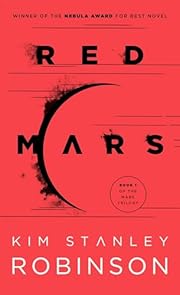

Auf ein Miniaturbild klicken, um zu Google Books zu gelangen.
|
Lädt ... Red Mars (Mars Trilogy) (1993. Auflage)von Kim Stanley Robinson
Werk-InformationenRoter Mars von Kim Stanley Robinson

» 22 mehr Favorite Series (115) Nebula Award (21) Books Read in 2022 (635) Books Read in 2008 (35) Books Read in 2023 (3,927) Books Read in 2012 (161) al.vick-series (251) Unread books (874)
I have yet to read a [a:Kim Stanley Robinson|1858|Kim Stanley Robinson|https://d202m5krfqbpi5.cloudfront.net/authors/1376955089p2/1858.jpg] where I did not wish the book was significantly shorter, and [b:Red Mars|77507|Red Mars (Mars Trilogy, #1)|Kim Stanley Robinson|https://d202m5krfqbpi5.cloudfront.net/books/1320484020s/77507.jpg|40712] was no exception. I love the first third of this novel, but after that things just drag on interminably. Not much happens plot-wise, and the characters develop (if at all) in not particularly interesting ways. But I know this is just my perception; you should probably pay more attention to the positive reviews from other readers. Strong start, and a strong finish, but I struggled to get through the middle part of the book, nearly giving up several times. Did not like many of the protagonists (except for the Russian engineer who was great) and found a few of them actively loathsome. But there is much lovingly described engineering at a planetary scale, and the initial colonization and the chaotic war at the end were both fascinating. keine Rezensionen | Rezension hinzufügen
Ist enthalten inBeinhaltetWird beantwortet inHat einen ErgänzungsbandAuszeichnungenBemerkenswerte Listen
Kim Stanley Robinsons Roman Roter Mars ist das erste Buch einer Trilogie über die Siedlung des roten Planeten. Ihm folgen Grüner Mars und Blauer Mars. Roter Mars hat 1993 die Nebula-Award für den besten Roman gewonnen, die von den Science Fiction Writers of America vergebene Auszeichnung, die als eine der höchsten für SF gilt. Diese Auszeichnung ist auch durchaus berechtigt: Roter Mars ist eine kolossale Leistung in der Erfindung einer nahen Zukunft, ein detailreich ausgedachtes Gedankenspiel darüber, wie man eine fast tote Welt mit technologischen Mitteln zum Leben erwecken könnte. Keine Bibliotheksbeschreibungen gefunden. |
Aktuelle DiskussionenKeineBeliebte Umschlagbilder
 Google Books — Lädt ... Google Books — Lädt ...GenresMelvil Decimal System (DDC)813.54Literature English (North America) American fiction 20th Century 1945-1999Klassifikation der Library of Congress [LCC] (USA)BewertungDurchschnitt: (3.83) (3.83)
Bist das du?Werde ein LibraryThing-Autor. |
||||||||||||||||||||||||||||||||||||||||||||||||||||||||||||||||||||||||||||||||||||||||||||||||||||||||||||||||||||||||||||||||||||||||||||||||
The strongest part of the book was the character portrayal and development. They felt realistic, well rounded, flawed and believable as real people. We spent a lot of time inside their head, so we have a good grip on their varied motivations, ideologies, worldview, etc. This insight into the minds of Mars' first colonizers, the social dynamic that would organically emerge under such circumstances; their hangups and sheer feeling alienation, are all well achieved. However, by the end of the book, where some of the characters are hitting 70, 80, their voices and behavior felt stuck in those of younger people, even allowing for future tech.
So it's not all plot, all the time. This is what I expect from a mature writer, yet most modern sci-fi, especially TV and movies, have the most flat and basic characters across fiction.
He has an expert-level handle on the science, at least to the inexpert eye, and this too I found to be one of the book strengths. At times he luxuriated on geological details a bit too much for my; geology being my least favorite part of hard sci-fi science. (Had a similar peeve with Revelation Space.)
What felt dated was the identity politics dimension of it all. Yes, I know, I know. The orientalism and male/white/American/western gaze are flagrant. The way he spoke about Arabs and Muslims was a lil jarring. In this sense, very of a piece with the rest of the fiction from this era written by similar authors. Maya, in particular, is like a prototype of the Strong Woman as written by men, her function to the plot as a prop in the middle of the two leading man, the author focusing time and time again on her appearance and effect on men. We don't see her commanding or leading, which is what she is supposed to be on Mars for. Hiroko, one of the few Asian women named, and with a "speaking role," is a supergenius in her area and has an outsized sexual appetite, her demeanor described as odd and "alien." (Literally the words used in the book.) Ok.
On top of that, the ideological side wasn't very consistent. There are explicit criticisms of capitalism and corporatism, but diluted enough so you could be fooled into thinking that these are the forces that drive human progress. For the most part, America is represented as an unstoppable power, manifesting its destiny now beyond the atmosphere.
You can excuse and hand-waive both those things by saying "well, this is from the limited POV of this and that character, and doesn't represent the view of the author," but then, there's no attempt to balance this by going delving deep into the motivations of the characters on the other side of the line.
We spend the majority of the novel inside the minds of John and Frank, archetypical strong, wilful American men in the boomer mold, that can achieve anything they set their mind to because that's how America was built, goddammit! The communist/anarchist character, on the other hand, is consistently portrayed as idealistic, a madman, wild and out-of-it.
On the meta level, it was wild to get to the part where they watch Earth going to hell because of the oppression and depletion of resources caused by transnational corporations and inept governments, causing mass hunger and mass riots, so I guess even in the 90s they could see all that's happening at the moment coming. (